News
Narjas Zatat
Nov 21, 2016

Picture: HandmadePictures/istock
If you've made the decision to cut down on McDonald's meals and take one less sugar with your morning coffee, good for you.
However, while you may have made good decisions to avoid foods that are obviously high in saturated fats and sugars, your 'healthy' options may not be all that healthy after all.
Here are a number of foods that are supposedly better for you. And while many are, moderation must be observed.
1. Diet soft drinks
The first thing on the hit list is ‘diet’ drinks. Those on a diet will often choose the ‘zero sugar’ version of a drink. Less sugar may be better, but these drinks often contain artificial sweeteners and preservatives.
There is a growing body of evidence which suggests some artificial sweeteners actually trick your body into storing fat.
2. Instant noodles
For the few people out there who still consider instant noodles the ‘healthy’ option (and not just lazy, student food), not only do most brands contain MSG, but they’re often filled with over 20 grams of fat and lots of processed carbohydrates.

3. Coconut water
Coconut water has become the foodies' Drink of the Year. Supermarkets are stocking it in multipacks, and you can often find it in your local corner shop. Despite the fact that it may not contain as much sugar as mainstream juices (made from concentrate), there is still almost 4 teaspoons of sugar per 250ml of drink.
It all adds up.

4. Rice malt syrup
This type of syrup is produced by cooking rice flour, which has a glycaemic index of 98 (white bread is 100).
The syrup doesn’t contain fructose, the “bad” sugar which, in excess can overload your liver and force your body to turn the substance into fat. However it still contains other sugars like glucose, maltose and maltotriose. Excess consumption can produce similar effects to eating too much sugar-laden foods.

5. Almond milk
Almond milk is another fad that’s become mainstream. The problem is that many people drink almond milk as they would regular milk: for the protein.
However most almond milk contains very little actual almonds, therefore the drink tends to be low in protein and calcium.
Additionally, many brands have added sugar to make the almond milk taste better.

6. Breakfast biscuits
Some breakfast biscuits contain as little as 4g of protein, but up to 10g of sugars. Given its small size, it is unlikely that you will only eat one, resulting in the consumption of too much sugar early in the morning. Not a great way to start your day, right?

HT News.com.au
More: Scientists are going to town busting the biggest food myth there is
Top 100
The Conversation (0)
Sort by













